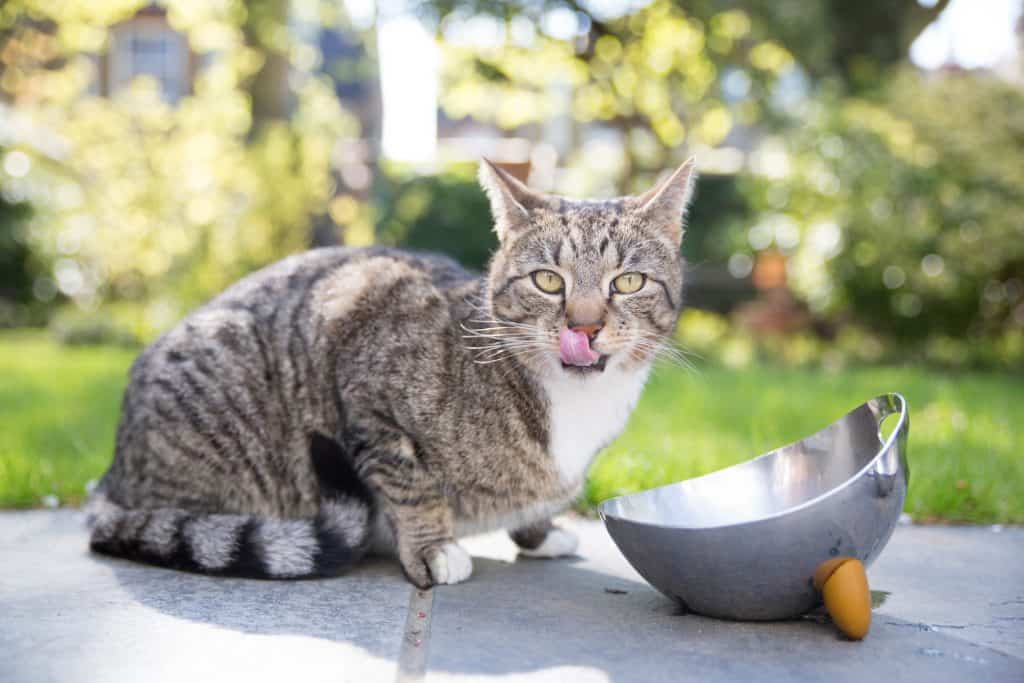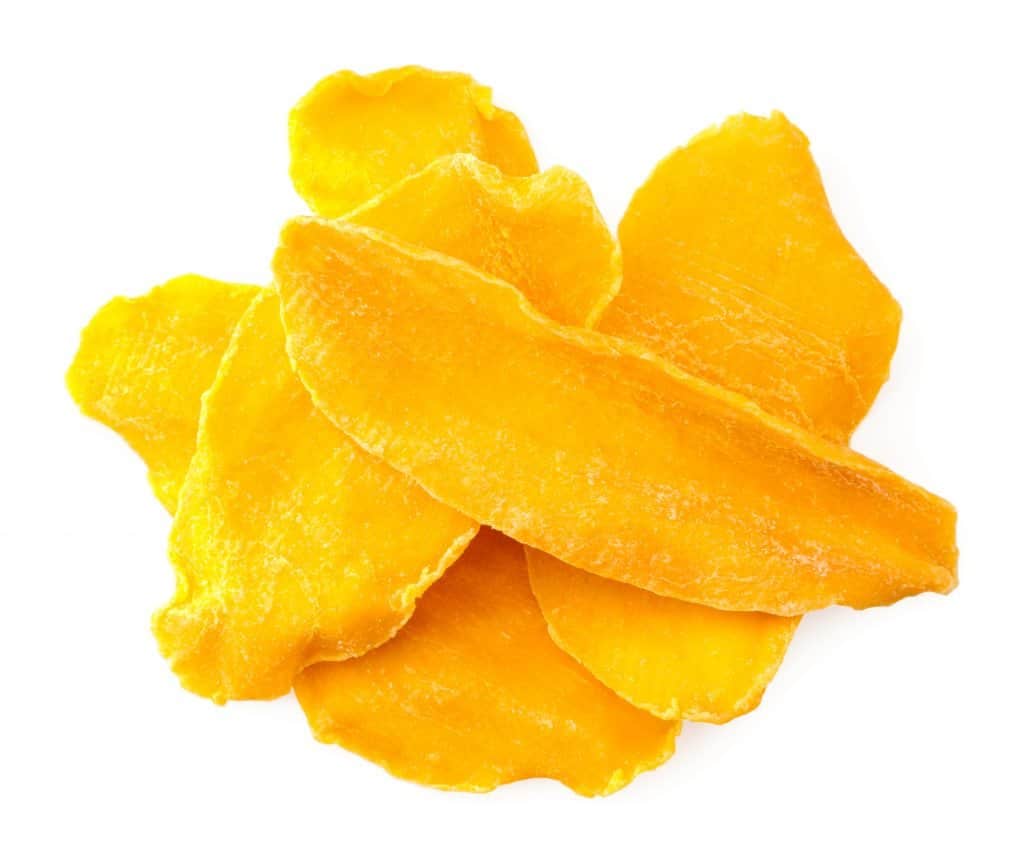Dried mango is a popular snack that is easy to take on the go! It is also considered to be a healthier alternative to snacks like cookies and candy for humans. If you are wondering can cats eat dried mango, this article will risk and benefits of feeding this food to your cat, as well as provide some better alternative foods.
Can Cats Eat Dried Mango?
Yes, cats can technically eat dried mango, but their intake should be limited. Mango is not toxic to cats; however the fiber, acidity, and sugar content of dried mango can negatively impact their digestive systems. There are many other fresh fruit alternatives that are better to feed your cat than dried mango.
Dried Mango Nutritional Information
Here is the basic nutritional content for one slice (chunk) of dried mango (8 grams):
- Energy – 25.5 kcal
- Protein – 0.196 grams
- Carbohydrates – 6.29 grams
- Dietary fiber – 0.192 grams
- Sugar – 5.3 grams
- Phosphorus – 4 mg
- Sodium – 13 mg
- Potassium – 22.3 mg
Dried mango tends to contain fewer nutrients when compared to fresh mango, as the drying process degrades some of the vitamins and minerals found in the fruit. In addition, the drying process removes the water and which leaves the fruit very concentrated in sugar which cats don’t need to consume.
What Are The Risks Of Feeding Dried Mango To Cats?
When feeding human foods to our pets, we have to be aware that a cat’s system isn’t made to process the same type of foods that we eat so there are risks with feeding certain human foods.
Some of the risks associated with feeding dried mango to your cat are as follows:
Digestive Distress and Diarrhea
Cats have more sensitive digestive systems when compared to humans. They are naturally carnivores, thus their digestive system can easily digest meats but it struggles to properly digest large amounts of fruit or vegetables.
As cats cannot efficiently digest fruits and vegetables, they do not receive the full nutritional benefits of the food.
The acidity of citrus and tropical fruits, such as mango, can also throw off the pH balance of their stomach, leading to digestive issues, such as diarrhea.
Liver Problems and Weight Gain
Fruit naturally contains sugar, and dried fruit contains more concentrated sugar. If your cat eats too much sugar, they may suffer from liver problems and weight gain.
The average adult cat only needs to consume between 200-300 calories a day. Therefore, the extra calories from fruit add to your cat’s weight, increasing the risk of obesity and severe health issues.

Cats with existing health problems are at greater risk for health issues from eating too much fruit. If your cat suffers from diabetes you should avoid feeding your cat dried mango as the sugar consumption can lead to liver damage and kidney damage which can be fatal over time.
Are There Benefits of Feeding Dried Mango to Cats?
Although it is not recommended that you feed dried mango to your cat, there are some nutrients that can be found in dried mango that can beneficial to cats. However, we found that the risks of feeding this food far outweigh any small nutritional benefit.
Mango contains vitamins A and B-6, both of which are beneficial to the health of your cat.
Vitamin A is essential for promoting better vision and skin health. Cats that receive enough vitamin A have healthier skin and fur. It is often found in fish, meat, eggs, and dairy products.
However, the amount of vitamin A found in dried mango is unlikely to have a major impact on your cat.
Vitamin B-6 helps protect your cat’s digestive tract, nervous system, and immune system. It also promotes better cognitive function.
As with vitamin A, many foods provide a better source of vitamin B-6 compared to dried mango. Such as meat, including fish, poultry, and pork.
Although some vitamins found in dried mango could be beneficial they aren’t high enough amounts to influence your cat’s health. Your cat should continue to receive the vitamins they require from vet-approved cat food.
Despite its limited nutritional value, dried mango may be beneficial for adding more variety to your cat’s diet. If your cat is curious about other foods, feeding a small piece of dried mango can satisfy their curiosity.
What Fruit Is Safe for Cats to Eat?
Cats do not typically eat fruit. However, if you choose to feed fruit to your cat as a snack, the following options are considered safe to eat in moderation:
- Bananas
- Apples
- Strawberries
- Blueberries
- Cantaloupe
- Seedless watermelon
Cats cannot eat any fruit with pits, such as cherries. Cherry pits contain cyanide, which is toxic to cats. The leaves, peels, stems, and seeds found in citrus fruit may also be toxic with some fruits so it is best to not feed any to your cat.
Bananas are considered safe and a good source of potassium. However, bananas also contain a lot of sugar, which your cat does not need.
Apples are safe to feed your cat in small amounts if you remove the skin and stem. You should also keep the apple core away from your cat.
Strawberries, blueberries, and other berries are typically safe, but your cat may not get much nutrition from them. You should also remove any stems or leaves.
Cats seem to love fresh watermelon and cantaloupe. Both options are safe when given as an occasional treat. If you plan on giving watermelon to your cat, remove the seeds or buy a seedless watermelon.
Conclusion
Can cats eat dried mango? Yes, cats can eat dried mango in small amounts, but they really shouldn’t eat dried mango as it doesn’t give them much nutritional benefit. Cats generally don’t need to eat much fruit, but if you are going to feed your cat fruit occasionally, there are better fresh fruit options to feed.
Giving your cat a small piece of dried mango as an occasional treat is not considered a major health risk, but you should look for better cat friendly snack alternatives.

